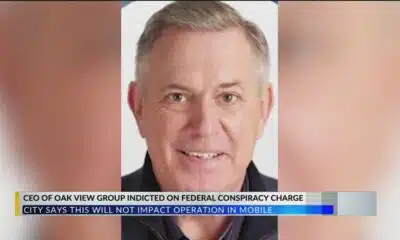News from the South - Alabama News Feed
an Alabama national forest • Alabama Reflector
As Trump enters office, a ripe oil and gas target appears: an Alabama national forest
by Lee Hedgepeth, Inside Climate News, Alabama Reflector
February 10, 2025
This article originally appeared on Inside Climate News, a nonprofit, non-partisan news organization that covers climate, energy and the environment. Sign up for their newsletter here.
CONECUH COUNTY — At the confluence of the Yellow River and Pond Creek in Alabama’s Conecuh National Forest, there’s a place of peace.
It’s a small, icy blue, year-round freshwater spring where the locals often go to unplug. Nestled inside Conecuh National Forest, Blue Spring is surrounded by new growth—mostly pines replanted after the forest was clear cut for timber production in the 1930s.
Nearly a century after that clear cut, another environmental risk has reared its head in the forest, threatening Blue Spring’s peace: oil and gas development.
As the Biden administration came to a close in January, officials with the U.S. Forest Service (USFS) initiated the process of “scoping” the possibility of new oil and gas leases in Conecuh National Forest.
GET THE MORNING HEADLINES.
On Jan. 6, USFS announced it would soon begin a 30-day comment period to solicit public opinion on the proposal, which includes the continued availability of tens of thousands of acres of federal land for oil and gas leasing and the possibility of leasing an additional, nearly 3,000 acres where the federal government owns mineral rights but not surface rights.
Conecuh National Forest stretches along the Alabama-Florida border, spanning more than 85,000 acres across two counties in the Yellowhammer State.
Past efforts to lease large tracts of land in Alabama’s national forests have been unsuccessful, with a planned 2012 lease auction nixed as a result of public outrage over environmental concerns.
Federal oil and gases leases in Alabama aren’t uncommon, though they’re rarely commercially productive, records show. Still, any oil and gas buildout can present various environmental risks, including air and water pollution in an area meant to be preserved as part of America’s environmental heritage, experts warn.
The Forest Service itself acknowledged the various risks involved in oil and gas leasing within Alabama’s national forests in a 2004 environmental impact assessment, though the agency also emphasized in the document its stated goal of expanding energy production and dismissed certain environmental impacts of the project as “negligible.”
In 2012, when federal officials renewed their interest in fossil fuel leases in Alabama, agency representatives pointed to the 2004 environmental assessment as a reason to allow for additional oil and gas development. Environmentalists objected to that analysis, arguing that relying on a then eight-year-old assessment to potentially approve thousands of acres of public lands for extraction was dishonest and legally dubious.
“We have a strong sense of place in the South, and our public forests should not be sold to the highest bidder to be destroyed for short-term profit,” Tracy Davids, director of Wild South, said of the 2012 proposal at the time. “These are the places that families hunt, fish, hike and recreate. Oil and gas drilling will ruin these lands and force us off of our national forests. This is an assault on our heritage and we won’t stand for it.”
This month’s announcement that the Forest Service will analyze oil and gas leasing within Conecuh National Forest may be a way for federal officials to shore up their legal position, updating the environmental assessment necessary for defending against litigation over new oil and gas leases there.
The new analysis would assess “how changed conditions and circumstances could result in a need to update leasing availability decisions described in the 2004 Forest Plan,” the announcement by the agency said.
The USFS’ previous environmental assessment did not include any analysis of the impact of expanded oil and gas development on efforts to mitigate climate change, something environmentalists argue should undoubtedly be part of the government’s decision-making calculus.
This month’s announcement did not mention climate change or greenhouse gas emissions but did say that updating the forest plan and other scoping documents would further government policy to “foster and encourage private enterprise in the development of economically sound and stable industries.”
This is a global biodiversity hotspot that’s being potentially targeted for oil and gas drilling.
– Will Harlan, Center for Biological Diversity
Including impacts on climate change in any environmental assessment around oil and gas development seems far less likely under Trump, who as a candidate regularly trumpeted oil and gas extraction, repeating the conservative catchphrase, “Drill, baby, drill.”
Much of the area proposed for lease availability surrounds recreation sites within the national forest, including Blue Lake, Open Pond, Conecuh Shooting Range and the Leon Brooks Hines Public Fishing Lake.
Will Harlan, southeast director and senior scientist for the Center for Biological Diversity, said environmentalists are worried about the new proposal, which he called “incredibly dangerous.”
“Conecuh National Forest is less than 1 percent of Alabama’s land, so when we’re talking about having oil and gas sites in the national forest, it’s concerning,” he said. “Alabama’s national forests rank No. 1 in the country for species diversity, especially of fish, turtles and mollusks,” he said. “This is a global biodiversity hotspot that’s being potentially targeted for oil and gas drilling.”
Allowing expanded oil and gas development in the forest would present an unnecessary risk, Harlan said.
“There are plenty of lands where oil and gas drilling can occur, but not this spectacularly diverse national forest,” Harlan said.
The U.S. Forest Service’s informal 30-day public comment period ends Feb. 12. Comments on the proposal can be submitted at this website or mailed to Garner Westbrook, USDA Forest Service, 2946 Chestnut St., Montgomery, Alabama, 36107.
YOU MAKE OUR WORK POSSIBLE.
Alabama Reflector is part of States Newsroom, a nonprofit news network supported by grants and a coalition of donors as a 501c(3) public charity. Alabama Reflector maintains editorial independence. Contact Editor Brian Lyman for questions: info@alabamareflector.com.
The post an Alabama national forest • Alabama Reflector appeared first on alabamareflector.com
News from the South - Alabama News Feed
Mobile Arena management CEO indicted on federal charges
SUMMARY: The CEO of Oak View Group (OVG), hired to manage Mobile’s new arena, was indicted on federal conspiracy charges linked to bid-rigging in another city. Despite this, Mobile officials say the arena project remains unaffected and on schedule for early 2027 completion. OVG secured a 22-year contract in February to manage the new Mobile Arena, the Mobile Convention Center, and the Saenger Theatre, receiving $400,000 annually for operations, maintenance, and event booking. The City of Mobile confirmed no bidding was involved in contract selection, and a local OVG team now oversees these venues.
The head of the company hired to manage the new Mobile Arena is facing federal charges.
News from the South - Alabama News Feed
Mobile first responders bring home medals from World Police and Fire Games
SUMMARY: Mobile first responders excelled at the recent World Police and Fire Games in Birmingham, an Olympic-style event featuring over 60 sports with participants from 70+ countries. Mobile Police Officer Defferey Hollis won gold in the challenge ride and bronze in the slow ride, while Officer Josh Hart earned silver in the challenge ride, benefiting from local barricade-handling skills. Mobile Firefighter Collin Bryan placed fourth in the triathlon despite a broken foot sustained just weeks prior. The Games have been held biennially since 1985, uniting over 80,000 first responders worldwide. The team from Mobile aims for more victories at the next event in Perth, Australia.
At the World Police and Fire Games, first responders from all over the world competed in Olympic-style events. Several Mobile first responders represented the United States, bringing home medals.
News from the South - Alabama News Feed
Pediatrician Discusses MMR Vaccine Amid High Measles Case Numbers | July 9, 2025 | News 19 at 6 p.m.
SUMMARY: Measles cases in the U.S. have surged to levels not seen since the 1990s, following increased vaccine skepticism after the COVID-19 pandemic. Pediatrician Dr. William Van Cleave emphasizes the MMR vaccine’s safety and effectiveness, noting two doses provide up to 96% protection. This year, children 19 and younger make up the majority of measles cases, with three reported deaths. Despite no cases in Alabama, neighboring states like Tennessee and Georgia have seen outbreaks. Concerns about vaccine side effects have grown, even influencing federal vaccine board changes. Dr. Van Cleave urges vaccination, especially as school increases exposure to illnesses.
Measles cases in the U.S. have reached a more than 30-year high
News 19 is North Alabama’s News Leader! We are the CBS affiliate in North Alabama and the Tennessee Valley since November 28, 1963.
https://whnt.com/
https://www.facebook.com/whntnews19
https://www.instagram.com/whntnews19/
https://twitter.com/whnt
-
News from the South - Arkansas News Feed6 days ago
Real-life Uncle Sam's descendants live in Arkansas
-
News from the South - Georgia News Feed6 days ago
'Big Beautiful Bill' already felt at Georgia state parks | FOX 5 News
-
News from the South - Oklahoma News Feed6 days ago
LOFT report uncovers what led to multi-million dollar budget shortfall
-
News from the South - Alabama News Feed7 days ago
Alabama schools to lose $68 million in federal grants under Trump freeze
-
News from the South - Missouri News Feed7 days ago
Celebrate St. Louis returns with new Superman-themed drone show
-
Local News6 days ago
Maroon Tide football duo commits to two different SEC Teams!
-
News from the South - South Carolina News Feed7 days ago
South Carolina lawmakers react as House approves Trump’s sweeping economic package
-
News from the South - North Carolina News Feed5 days ago
Raleigh caps Independence Day with fireworks show outside Lenovo Center














































